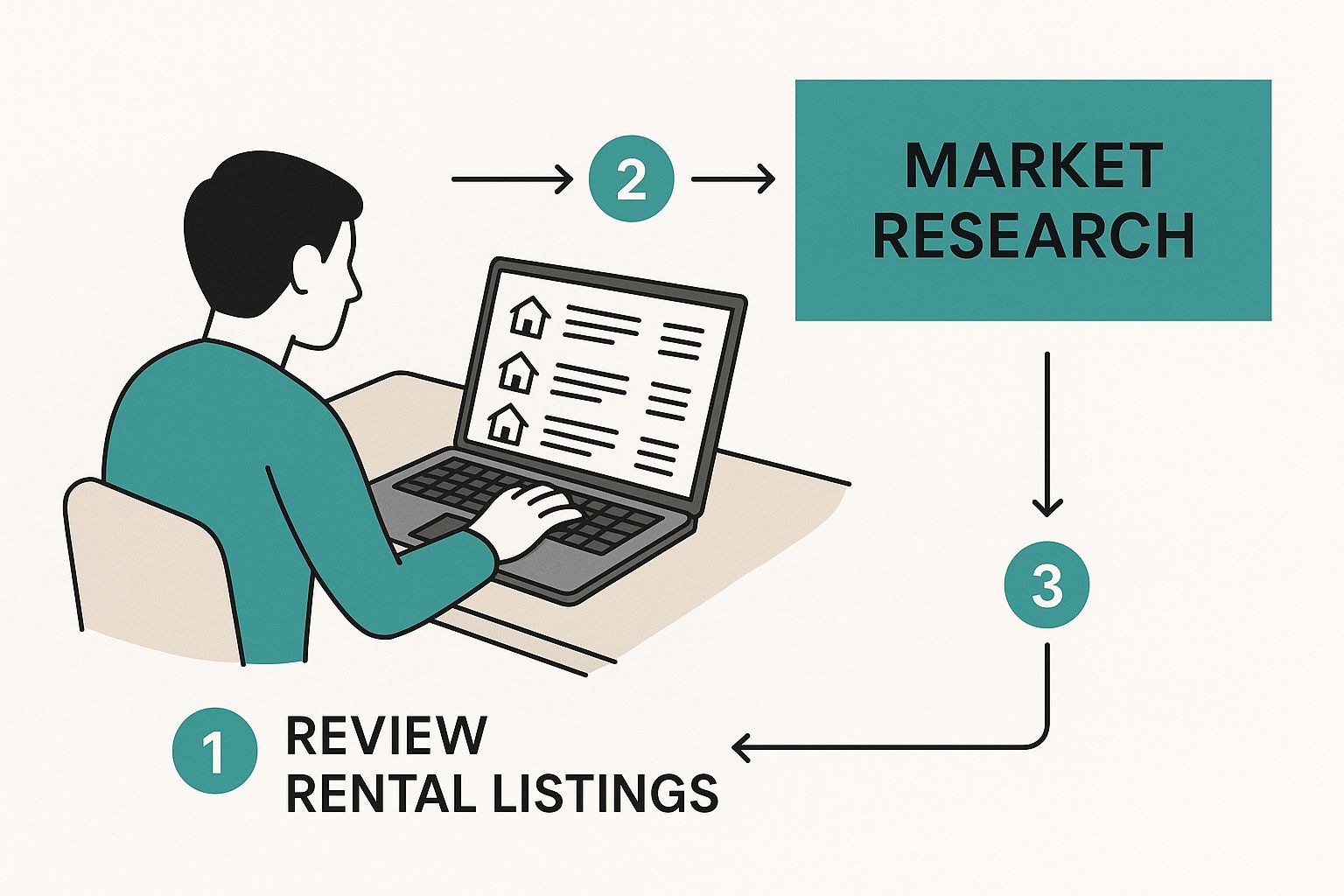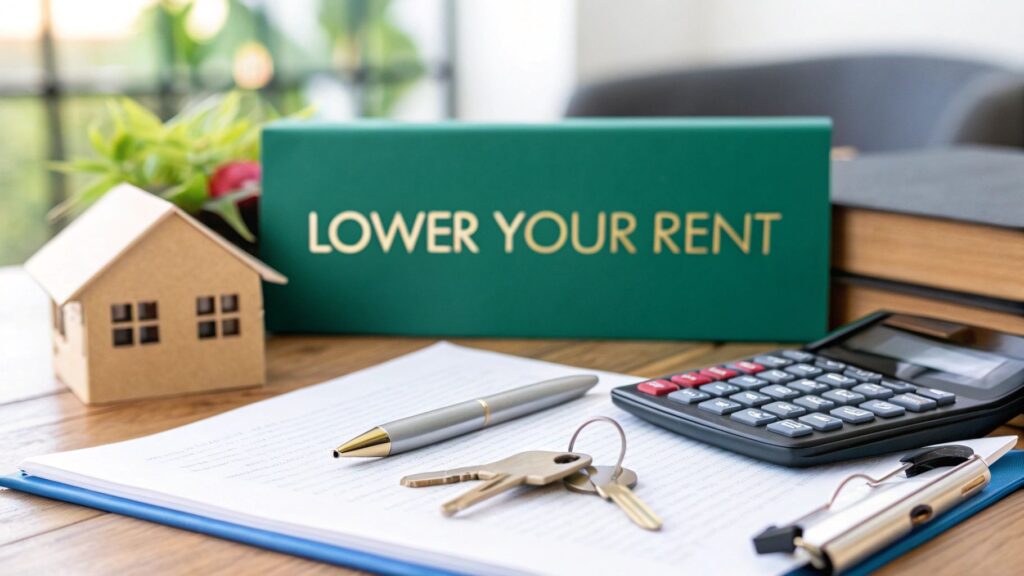You absolutely can negotiate your rent, but the secret is treating it like a business proposal, not a personal plea. The whole game changes when you build a strong case supported by real market data. You're not just asking for a discount; you're presenting a logical, mutually beneficial deal.
Laying the Groundwork for a Successful Negotiation
Before you even think about picking up the phone, you need to do your homework. A rent negotiation is won or lost in the prep phase. If you go in empty-handed, you’re just asking for a favor, and that’s easy for a landlord to say no to.
Your mission is to build a case so solid that your proposed rent seems completely reasonable. This means digging into the local rental market, showcasing your value as a tenant, and getting your timing just right. Get these pieces in place, and you’ll transform a hopeful wish into a compelling business case.
Know Your Local Market Inside and Out
First things first: you need to become the local expert on what apartments like yours are actually renting for right now. Forget what you think the price should be—you need cold, hard data.
Start by looking at current listings for similar units. Check for apartments in your building and those right next door. Make sure you’re comparing apples to apples: same square footage, similar amenities, and comparable condition. A landlord is much more likely to listen to, "I saw that similar one-bedroom units in the building next door are listed for $1,850," than a vague complaint about the rent being too high.
This process of gathering "comps" (comparable properties) is your single most powerful tool. It grounds the entire conversation in reality, not emotion.

Use Timing and Your Tenant History as Leverage
When you make your move matters. A lot. If you approach your landlord in the middle of winter—a notoriously slow season for rentals—you’ll likely find them much more flexible than during the summer moving rush.
Ideally, you should kick off the conversation 60-90 days before your lease is up. This gives everyone plenty of time and shows you're planning ahead, not making a last-ditch effort.
Your greatest asset is being a low-maintenance, reliable tenant. A landlord’s biggest headache (and expense) is turnover. The costs of cleaning, painting, advertising, and lost rent during a vacancy add up fast.
Don't be shy about your track record. A history of on-time payments and taking good care of the property is gold. Subtly reminding them that keeping a proven, trustworthy tenant—even at a slightly lower rent—is often more profitable for them in the long run.
Before you make contact, run through this checklist to make sure you have all your ducks in a row. It’s a simple way to organize your research and talking points.
Your Pre-Negotiation Checklist
| Action Item | Why It Matters | Where to Find Info |
|---|---|---|
| Gather 3-5 Comps | Provides objective data to support your proposed rent. | Zillow, Apartments.com, local rental sites. |
| Review Your Lease | Know the exact renewal date and notice period required. | Your original lease agreement document. |
| Document Your Tenant History | Reminds the landlord of your value (e.g., on-time payments). | Your bank statements or rental payment portal history. |
| Assess the Season | Identifies if you're in a high-leverage (off-season) or low-leverage (peak season) period. | General real estate market trends for your city. |
| Decide Your "Walk-Away" Number | Sets your absolute maximum rent, so you know when to stop negotiating. | Your personal budget and the market research you've done. |
Having this information prepared doesn't just make you look professional; it gives you the confidence to navigate the conversation effectively.
Building Your Case for a Lower Rent

Now that you've laid the groundwork, it's time to gather the hard evidence that will make your request impossible to ignore. Think of this less as asking for a favor and more as presenting a solid business case. The goal is to collect specific, undeniable data that shows your proposed rent is fair for everyone involved.
I recommend starting a dedicated folder—on your computer or a physical one—to keep all your research organized. The core of your argument will be comparable listings, or "comps," from your building and the immediate neighborhood. But don't just stop at the price. The real story is in the details.
Look Beyond the Asking Price
A listing price is just an advertisement. To really know what the market is doing, you have to dig a little deeper. As you browse listings, pay close attention to a few key signals:
- Days on Market: How long has a similar apartment been sitting empty? If a unit has been vacant for 30 days or more, it’s a strong sign the landlord has overpriced it for the current market.
- Move-In Incentives: Are other buildings offering one month of free rent, waived amenity fees, or a free parking spot? These perks are a form of price reduction and are powerful bargaining chips for you.
- Net Effective Rent: This is a fantastic metric to bring up. If a landlord gives one month free on a 12-month lease, the tenant is really only paying for 11 months. Do the math to find the "net effective rent" to show what people are actually paying per month over the lease term.
Here's an insider tip: Think like a property investor. A vacant apartment bleeds money every single day it sits empty. A smart landlord would often rather secure a great tenant at a slightly lower rent than risk another month of vacancy holding out for top dollar.
Document Issues with Your Own Apartment
Your research isn't just about what's happening elsewhere; it's also about the reality of your specific unit. This is your chance to catalogue any ongoing issues or unfulfilled promises that affect your apartment's value.
Make a calm, objective list of these drawbacks. This isn't about being nitpicky or complaining. It's about framing these items as things that detract from the property's premium market value. A constantly drafty window, appliances that are much older than those in renovated units, or a slow-draining tub are all fair game. For more ideas on what to watch for, it helps to review the common mistakes to avoid when renting an apartment in Boca Raton.
Understanding a landlord's financial motivation, like how to calculate ROI on a rental property, can give you a major advantage. It helps you speak their language. With the national apartment vacancy rate recently hitting around 8%, many markets are becoming more renter-friendly. Landlords are feeling the pressure, which gives you more leverage than you might think.
The final step is to organize all this information into a clean, easy-to-read summary. Having your facts straight shows you're a serious, professional tenant who has done their homework.
How to Write a Persuasive Rent Negotiation Email

Okay, you've done the legwork. You know the market rates, and you have your talking points ready. Now comes the part that trips a lot of people up: putting it all into an email that your landlord will actually read and consider.
How you frame your request is just as important as the data you've gathered. The goal here is to sound like a reasonable, professional tenant—not a demanding one. A well-crafted email sets a collaborative tone right from the get-go, making your landlord much more receptive to what you have to say.
Kick things off with a simple, courteous opening. A quick line about how much you've enjoyed living in the apartment can work wonders. It reminds your landlord that you're a good tenant, and finding another one is a hassle they'd probably rather avoid.
From there, you can pivot to the reason you're writing. Lay out your research clearly and concisely, referencing the comparable listings you found. Keep emotion out of it; let the facts do the talking. You want to demonstrate that your proposed rent is based on the current market, not just wishful thinking.
Crafting Your Counteroffer
When it's time to state your price, be specific. A vague request like "I'd like to ask for a rent reduction" is easy to dismiss. Instead, propose a concrete number backed by your research.
For example, you might write:
"Based on similar units in the area currently listed for rent, I would like to propose a new monthly rate of $1,950 for a 12-month lease renewal."
This kind of directness shows you’re serious and have done your homework. It gives your landlord a solid starting point for a conversation, rather than leaving them to guess what you want.
If you want more context on what the leasing process looks like from start to finish, our guide on https://cynthiagardens.com/navigating-the-rental-market-how-to-secure-an-apartment-lease-near-you/ is a great resource.
Pro Tip: Always end your email on a positive, flexible note. Express your desire to stay and suggest a quick call to discuss it further. This shows you’re open to a real conversation, not just making a demand.
Remember, presentation matters. If writing isn't your strong suit, it never hurts to improve your writing skills. A polished, professional message signals that you’re a tenant who takes things seriously, and that alone can make your proposal more persuasive.
Talking to Your Landlord: How to Have the Negotiation Conversation
Okay, this is it—the moment of truth. Whether you’re on the phone or meeting in person, this is where all your prep work pays off. The absolute key here is to keep your cool. You want to be professional, polite, and aim for a win-win. This isn't about making demands; it's about having a business-like conversation to find a solution that works for both of you.
I always recommend starting on a positive note. Remind them that you genuinely enjoy living in the apartment and that you’d love to continue your tenancy. It’s a small thing, but it immediately positions you as a good, reliable tenant they want to keep.
From there, you can pivot to the topic at hand. Try something like, "I'm calling because I'd love to discuss the lease renewal. I've been looking into the current rental rates in our neighborhood and wanted to share what I found."
This simple transition makes it clear the conversation is based on market facts, not just your personal feelings. Lay out your research calmly, mentioning the specific comparable apartments you found and their going rates.
What to Do When They Push Back
Your landlord has likely had this conversation before, so they'll have some go-to responses. Being ready for them is half the battle. If you know what to say, you can keep the discussion on track instead of getting shut down.
Here are a couple of common scenarios:
-
They say: "The new rent is firm based on the market."
Acknowledge their point, but gently steer them back to your data. You could say, "I understand that's your position. The research I've done for very similar units, like the one over at [competing address], is showing an average closer to [your proposed rent]. Is there any wiggle room to get us closer to that market rate?" -
They say: "My expenses and taxes have gone up."
This is a valid point, so show some empathy. But then, bring it back to market value. Try this: "I can definitely appreciate that costs are rising everywhere. My offer is based on the fair market value for tenants in this area, which helps keep your property competitive and avoids a costly vacancy."
Remember, this is a dialogue, not a debate. Your goal isn't to "win" an argument. It's to find common ground. By listening to their side and countering with facts, you turn a potential confrontation into a collaborative problem-solving session.
Thinking Beyond Just the Rent
What if your landlord absolutely will not budge on the monthly price? Don't give up yet. Now's the time to get creative and negotiate for other valuable perks that can make the increase feel more palatable.
Sometimes, landlords are more flexible on non-cash items. For instance, could you offer to sign a longer lease—say, for 18 months—in exchange for keeping your current rent? A longer commitment means guaranteed income and no turnover costs for them, which is a huge plus.
You could also negotiate for other improvements. Maybe it's a new dishwasher, a dedicated parking space at no extra charge, or even a fresh coat of paint. These kinds of concessions are often an easier "yes" for a landlord and can add real value to your living situation.
Getting Your New Rental Agreement in Writing
You did it. You negotiated a better rent price. Before you pop the champagne, there's one last, crucial step: getting it all in writing. A verbal agreement is great, but it won't hold up if there's ever a dispute.
This is where a lot of people drop the ball. Without a written record, any promises your landlord made can easily be forgotten or denied down the road, leaving you stuck with the original, higher rent. What you need is a formal, signed document.
The goal is to secure a lease addendum. This is just a fancy term for a document that officially modifies your existing lease with the new terms. If you're new to this, check out these smart tips for navigating apartment lease agreements to get comfortable with the language and structure.
What to Look For in the Lease Addendum
Don't just skim it and sign. Read the addendum carefully to make sure every single detail you agreed upon is there. It's usually a simple document, but the specifics are what count.
Here’s a quick checklist of must-haves:
- The new rent amount: The exact dollar amount should be clearly stated.
- The effective date: Pinpoint the precise date the new rent kicks in.
- Any other perks: Did you get a free parking spot or a waived pet fee? Make sure it's explicitly mentioned.
- Signatures from both parties: The addendum isn't official until it's signed and dated by both you and your landlord (or their representative).
Always, always keep a signed copy for your own records. This document is your proof and your protection. It’s what locks in the savings you worked so hard for.
Once you have the draft, it's not a bad idea to run it through a final check. You could even use a tool like an AI-powered rental agreement analyzer to give it one last review before you put ink to paper. This ensures you haven't missed anything important.
Still Have Questions About Rent Negotiation?
Even with a solid game plan, it's natural to have some lingering questions about talking rent with your landlord. Most renters do. Let's walk through some of the most common uncertainties so you can approach the conversation with total confidence.
Think of this as clearing up the "what ifs" that might be holding you back. Knowing how to handle these common scenarios keeps you cool and collected when it's time to talk.
When Is the Best Time to Bring It Up?
In negotiations, timing can make all the difference. If you're renewing your lease, the sweet spot is typically 60 to 90 days before your current one ends. This gives everyone plenty of time to work things out without feeling pressured by a looming deadline.
For a new apartment, the golden moment is right after you've been approved but before you've signed anything. They've already picked you, which puts you in a much stronger position. Keep in mind that the rental market tends to slow down in the winter, so landlords are often more willing to bargain during those colder months.
What if They Just Say "No"?
Hearing "no" on a lower price doesn't mean the conversation is over. It just means it's time to get creative. If a rent reduction is a non-starter, pivot the discussion toward other perks that could save you money or improve your living situation.
Consider asking for things like:
- A longer lease term: Propose an 18-month lease to lock in the current rate and guarantee them a long-term tenant.
- Included perks: Could they throw in a parking spot or waive the monthly amenity fees?
- A small upgrade: Maybe it's time for that new dishwasher you've been eyeing, or perhaps the bedroom could use a fresh coat of paint.
The goal is to find value in other areas. A landlord who won't budge on the monthly rent might be surprisingly flexible on a one-time upgrade or a fee they can easily waive.
Asking for a lower rent isn't rude—it's just business. As long as you approach it politely, professionally, and with solid research to back you up, it's a completely reasonable request. Landlords know that keeping a reliable tenant is almost always better for their bottom line than the hassle and cost of finding a new one.
Treating it like a respectful business discussion is your best bet for a good outcome, even if the final answer on price is still no.
At Cynthia Gardens, we believe in providing clear, straightforward leasing options in a prime Boca Raton location. If you're looking for a community that values its residents, explore our available one-bedroom apartments today.
